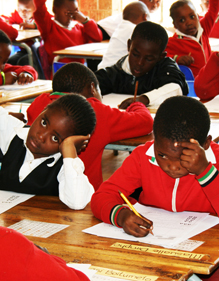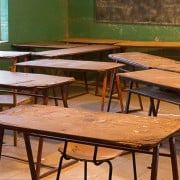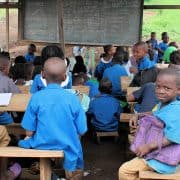|
Getting your Trinity Audio player ready...
|
 As bells ring and classes kick off for the 2013 academic year, Corruption Watch begins its monitoring of schools – a big focus for the organisation this year. Since launching we’ve received more than 60 reports of possible corruption in schools, mostly involving the embezzlement of funds by principals and administrators, corruption in procurement processes and maladministration by school governing bodies.
As bells ring and classes kick off for the 2013 academic year, Corruption Watch begins its monitoring of schools – a big focus for the organisation this year. Since launching we’ve received more than 60 reports of possible corruption in schools, mostly involving the embezzlement of funds by principals and administrators, corruption in procurement processes and maladministration by school governing bodies.
In this, the first of a two-part article, we highlight situations in schools in Limpopo, Mpumalanga, Gauteng and KwaZulu-Natal. Next week we’ll bring you updates from Northern Cape, Free State, North West and Eastern Cape. Where possible, we’ve used cases reported directly to Corruption Watch.
Limpopo
Last year this province bared the brunt of the country’s education crisis when textbooks failed to be delivered to schools on time, in some cases leaving pupils without learning material for more than six months. Gross mismanagement of funds and tender irregularities were said to be causes at the time. While probes into this fiasco are ongoing, we turn the focus to poor conditions reported in schools this year and will continue to investigate why allocated funds are not being directed to where they are needed most.
Although the year has just begun, there have already been reports of schools in Limpopo with poor sanitation systems. Eye Witness News reported that at least 100 schools in the province have few or no working toilets, no water, and in some cases there are no doors in ablution blocks. Lobby group Section 27 raised the issue of sanitation with the Limpopo education department six months ago; however no progress has been made. The department says it acknowledges the problem and hopes to implement a plan of action to provide toilets to 111 schools by the end of the financial year.
According to the Sowetan, pupils at Semaneng Secondary School in Limpopo have been without a school roof for nearly two years after it was blown away during a heavy storm in October 2011, destroying school furniture and leaving 169 pupils with limited resources. Although the department has said it is “busy” working to fix the matter, teachers at the school say that no progress has been made and pupils have been missing school on rainy days to avoid getting sick.
Mpumalanga
Last year Corruption Watch investigated complaints of a ghost teacher at HM Swart Laerskool in Bethal, reporting at the time that principal Kobus du Plessis faked class attendance registers and claimed the teachers was sick. The provincial education department said it would investigate the matter and give answers “no later than end of November” 2012. Since that time Corruption Watch has been in regular contact with the department for updates on the probe. Many phone calls and e-mails to the department this year have failed to get further clarity from officials and Du Plessis remains head of the school. We’ll continue to monitor the situation.
The Corruption Watch team are also looking into a schools transport programme in this province, where the cost has escalated from R8.2-million to R354-million over nine years, as reported by City Press.
The programme began in 1996 and was run by the provincial department of education with the aim of promoting access to education through an effective and efficient transport system. In 2009 a commission of inquiry was launched amid allegations of corruption in this sector and the initiative was then moved to the department of public works, roads and transport. Since then, more than 200 transport operators have been kicked out of the business “after it was awarded to the company partly owned by a tenderpreneur who has scored multimillion-rand contracts from the government”, according to City Press
Gauteng
Some R1-billion was set aside for the national nutrition programme in schools for 2012/2013, but it seems not all of the allocated resources are going to the intended recipients. Last year Corruption Watch received a number of reports about theft of food intended for the national feeding scheme. We spoke to staff members of Montsosi School in Sebokeng, who reported that some of their colleagues were stealing food and stationery. The whistleblowers stated that every month 12 50kg bags of mielie meal are delivered to the school, and of that, only two bags go to the schoolchildren. Since the story was published, the department has told Corruption Watch that they are looking into the matter, but have not commented on their findings.
KwaZulu-Natal
In October 2012 we reported that 10 officials in this province’s education department would be suspended for abusing the school’s national nutrition programme. For many children who live in impoverished and rural areas in KZN, this is their only daily meal. It seems, however, as if teachers and officials within the department are using the feeding scheme for their personal gain.
Officials have been accused of colluding to inflate suppliers’ prices and recommending certain suppliers to directors in exchange for kickbacks. But the MEC for education in the province, Senzo Mchunu, is determined to root out corruption in this scheme and a Provincial National School Nutrition Programme Committee has been set up to look into matters. “This large amount of taxpayers’ money should be put to good use and as a department we will guard it vigilantly and jealously against those who intend to abuse it,” said Mchunu.
Education remains one of the largest categories of government spending: R207-billion was allocated to the sector for 2012/13, with projections that this may increase to R236-billion over the next three years. With reports by rights group Equal Education that 3 500 schools in the country are without electricity and another 2 400 do not have running water, one has to ask how this is possible.







